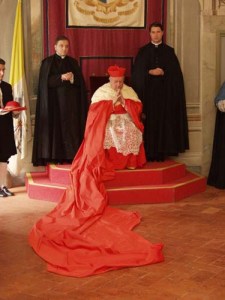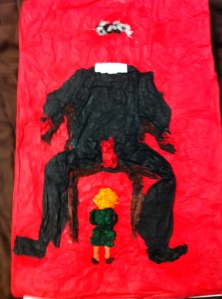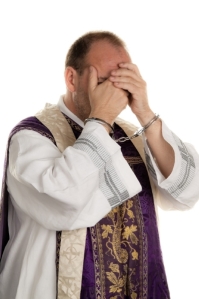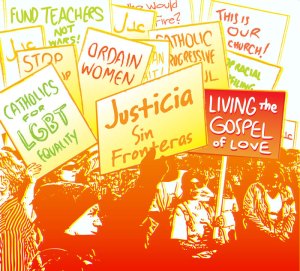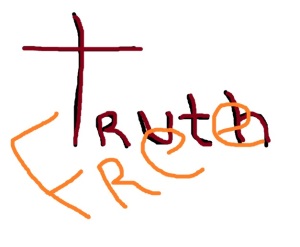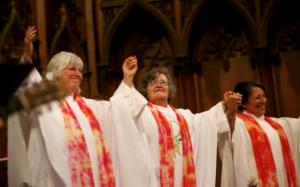You are currently browsing the tag archive for the ‘changing the Catholic Church’ tag.
How do I process my grief?
Does suffering have any meaning?
Do we live in a random chaotic universe?
Is it time to re-evaluate my understanding of “God”?
This book is for anyone who has suffered a loss – of safety, of one’s home, of health, of a loved one or a relationship, or of one’s faith … and found themselves asking, “Why?” And then wondering, “Who am I asking?” and hoping they were not alone.
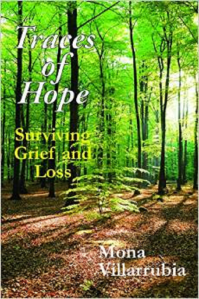
A Mother – protecting her children (the membership) from historical truth and theological insight, and the responsibilities of independent thought. Trying desperately to keep her babes from leaving the nest.
A Lioness – protecting her cubs (the clergy) by hiding them from attack, redirecting attention away from them, retaliating against their attackers.
A “Uriah Heep” – whose only concern is to protect and gain control over the moneys taken in by the business. Motivated by greed, and putting on a face of insincere humility.
A model of the Church of “Bishop” Francis? – I remain hopeful.
According to the Jesuit poet G.M. Hopkins, the “grandeur” of God flames out in the world and in nature. Hopkins believed that, despite our destructive ways, humankind cannot destroy the presence of God’s grace in nature, renewed by the Holy Spirit each day at dawn. In a similar vein, I believe that the sins of the Catholic leaders cannot destroy the power of God’s grace being experienced today in the faith and hope of so many Catholics.
Thousands of Catholics are committed to a church in which the priestly vocations of women are treated with equal respect to the priestly vocations of men, and in which a life of celibacy is not a pre-requisite for a life of priestly ministry.
This is a time for renewal, a new dawn for our Church. The momentum for change is building at the grass-roots level, the people of God. All the disenfranchised need a voice; all the abused and betrayed deserve to be heard. And the journey forward will not be easy.
But what about the abusers in our church? Can’t a priest be forgiven and receive the grace of God to overcome his compulsion to abuse children? As Elizabeth Dreyer eloquently expresses in Manifestations of Grace, grace has the power to transform, to bring life out of death, hope out of despair. I firmly believe in God’s grace and that I am alive only through the power of God’s grace. God’s grace is not in question. The issue, however, is not God’s grace, but the power of the human person to remain open and respond to that grace.
Repentance is not enough; reception of the sacraments is not enough. Neither personal repentance nor communal sacraments have the power to change a sexual disorder. Our bishops made this assumption in the past with horrific results, But now it should be clear to them: credibly accused pedophile priests must be taken out of ministry, regardless of statutes of limitations.
As a survivor who still considers herself a Catholic, the most pressing issue right now is not how can I heal (I have learned what I need to do) but how can the church heal?I do believe, as Jesus himself modeled, that the greatest challenge for any Christian, any human being, is to turn evil into good. Great evil has been perpetrated against our children, and also against our whole church community through the deceptions and cover-ups that made the Catholics in the pews unwitting accomplices in a morally corrupt institutional structure. The pain of healing will be no less than the pain caused by that evil. Our journey to forgiveness and healing will be long.

“Some people worry when they have questions about their faith, or when they begin to realize that the old explanations, good enough before, no longer seem to offer coherent meaning. This worry is misplaced. To believe means to want to understand, and to want to understand means to be asking questions … Faith is precisely the opening of one’s mind, one’s understanding to God. But what God reveals to us is not apparent instantaneously….”
Monica K. Hellwig, Understanding Catholicism (Paulist Press, 2002)
I wrote the excerpt below in 2004. I was very optimistic then. Has the Church learnt anything since I published these words of hope? The recent revised norms seem to suggest not. Women who desire nothing more than to follow the calling of the Holy Spirit of God, God’s Shekhinah (a feminine characteristic, ironically) are portrayed as sinners who deserve nothing less than excommunication, along with any Catholics who support them. Is it time to give up?
The Journey Forward for our Church
… According to the Jesuit poet G.M. Hopkins, the grandeur of God flames out in the world and in nature. Hopkins believed that despite our destructive ways humankind cannot destroy the presence of God’s grace in nature, renewed by the Holy Spirit each day at dawn. In a similar vein, I believe that the sins of our leaders cannot destroy the power of God’s grace being experienced today in the faith and hope of our Catholic community.
This is a time for renewal, a new dawn for our Church. The momentum for change is building at the grass-roots level, the people of God. All the people need a voice; all the people deserve to be heard. And the journey forward will not be easy.
…But what about God’s grace? Can’t a priest be forgiven and receive the grace of God to overcome his compulsion to abuse children? As Elizabeth Dreyer eloquently expresses in Manifestations of Grace, grace has the power to transform, to bring life out of death, hope out of despair. I firmly believe in God’s grace and that I am alive only through the power of God’s grace. God’s grace is not in question. The issue, however, is not God’s grace, but the power of the human person to remain open and respond to that grace.
. . . I do believe, as Jesus himself modeled, that the greatest challenge for any Christian is to turn evil into good.
Where is evil to be found in our church? In the crimes and careers of abusive priests and religious; in the coverups, legal manipulations and obfuscations of bishops, cardinals and Congregations; in the rejection of victims of abuse, and in the attacks on individual Catholics who are committed to justice, equality and fidelity to God’s grace.
I don’t believe that giving up on the church is the right answer. The church has nurtured and nourished my faith and the faith of millions, often despite its official doctrines and decrees. Today the church continues to nourish and nurture my faith but not through the liturgy, certainly not through any parish preaching, but through the courage of Catholic activists and writers, women and men, laity, priests, and religious. Contrary to Vatican opinion, these women and men do not risk their eternal souls, because fidelity to God’s Holy Spirit in the pursuit of truth and justice can never, logically, be a sin. It may be an offense against Vatican sensibilities and official doctrines and norms, but how can it be an offense against God? It would be a profound tragedy if these courageous individuals give up on the church, even if the official church is so ready to give up on them.
Call to Action has co-sponsored a petition with USA, CORPUS, RAPPORT, WATER and Women’s Ordination Conference.
“We, the undersigned, express our solidarity with Catholics who continue to seek equality, including those who practice feminist ministries and those who are ordained.”


